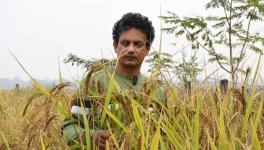Asansol Farmers Live in Fear of Land-Grabbing Gangs, Agriculture Takes hit
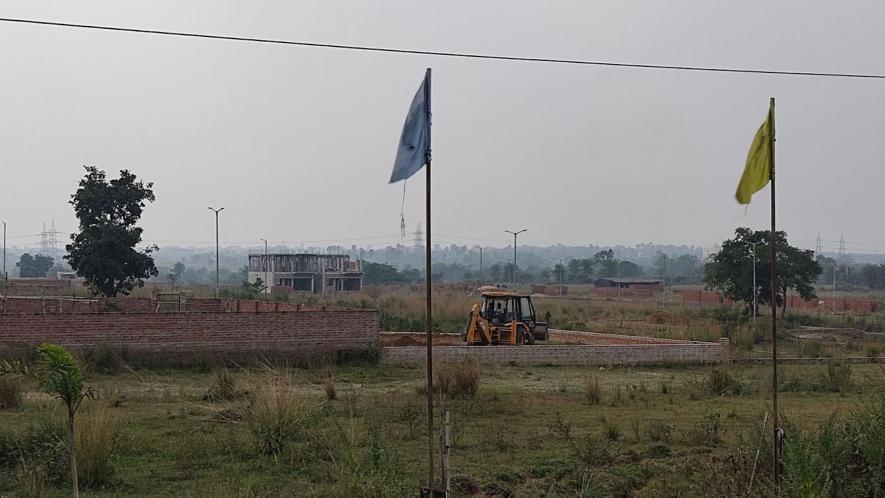
New residential plots under construction along NH-19 near Asansol’s Raghunathbati village.
West Bengal’s Asansol city, which once boasted of steel plants, coalmines, rivers and a unique mineral-rich geography, is plagued by land-grabbing gangs. News of shootouts and murders are often aired by local TV channels.
Agriculture has been severely impacted with farmers in constant fear of criminals grabbing their land. Large industrial warehouses and residential plots have appeared on agricultural plots.
On October 30, Arun Bauri, a resident of Lower Kumarpur, lodged an FIR alleging that Dinesh Gorai, a businessman from Raghunathbati, and his aides threatened him and his associates with a gun while they were working on his land on NH-19 right outside the village. Gorai and his men allegedly injured them with hockey sticks, forcing Bauri and his associates to flee.
On the same morning, Gorai lodged an FIR against nine people for firing at his car while he had stopped at a roadside eatery on NH-19.
Arjun Maji, the councillor of Ward 20, which includes Raghunathbati and a large section of the rural and urban areas around NH-19, told this journalist that land grabbers are occupying land. According to him, the attack on Gorai is related to such incidents.
“I have been fighting land grabbers for the past four years. They force people to sell their land, destroy small ponds that the locals use for irrigation and construct boundaries on lands for residential plots. This has been going on along the NH-19,” he alleged.
“The poor have been affected the most. A person with little or no income sells land as the last resort. Siudi and Raghunathbati villages are most affected by criminals.”
Maji dares to speak about land grabbing as he is part of the local government. “But the locals are too afraid to speak because criminals threaten them.”
According to him, most land grabbers belong to Jharkhand (12 km from Raghunathbati) or nearby areas. “They have pushed farmers and agriculture to the brink of extinction. A majority of villagers practise seasonal agriculture and the rest are daily wagers. The illiterate are employed in small companies and industrial units which sprang up around NH-19.”
Most villagers are too scared to speak about land grabbing. Subodh (name changed) said that “agriculture has been declining for the past 15 years”, given the erratic rains, pests, and animal grazing.
“I had more than 11 bighas on NH-19, right next to the village. But I was forced to sell it at a lower price. Residential plots have been constructed on my land,” he alleged.
He further alleged that large chunks of land around the village have been forcibly taken. “We filed cases but to no avail. It is impossible to fight the criminals. They will kill you, file false cases and finally force you to sell your land at a lower price”.
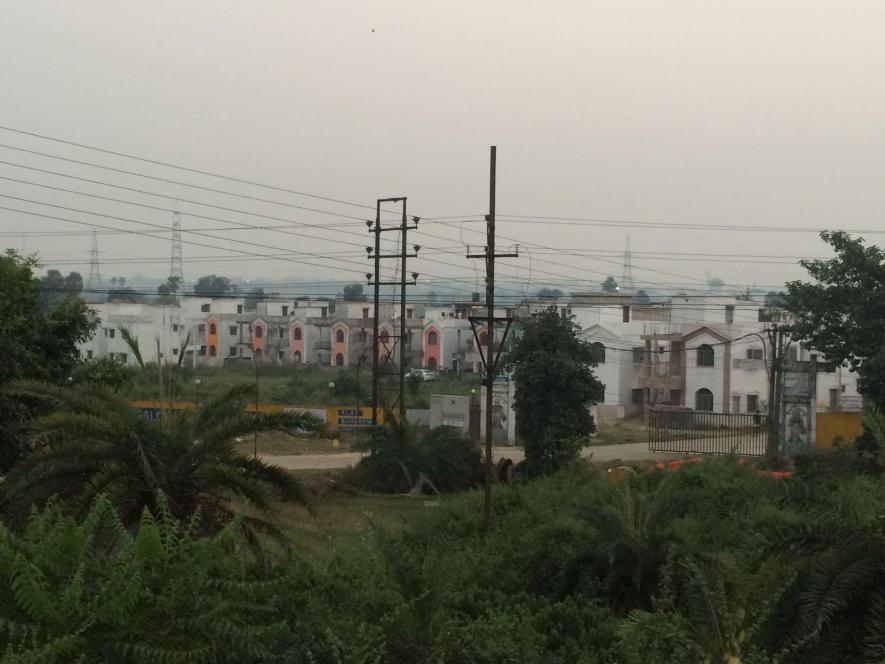
Residential plots along NH-19 near Raghunnathbati village.
Subodh is hopeless. “No one can do anything. It is impossible to fight the rich; they have the support of politicians, courts, cops, and sadly the village youth. I tried everything. I was beaten up and sustained serious injuries.”
He also alleged that around 50 men from the village find daily wage jobs with the gangs on land plots, brick kilns and construction projects while some have become criminals
Recalling the earlier lush paddy fields, Subodh said, “Farming was enough to sustain ourselves throughout the year.”
Now, there is little or no agriculture. “People are forced to find alternatives like setting up small shops or businesses or work as daily wagers.”
Before leaving, Subodh said, “It is useless writing about it. Nothing will change. What’s done is done—they can’t take any more land from me nor can I ask them to give it back.”
Ananata, a former farmer from the nearby Kalipahari village, along NH-19, said that erratic rainfall drastically affects farming.
“The village’s soil quality is too good. Any crop or seasonal vegetable can be grown. But the lack of water has made things difficult. Besides, agriculture is expensive as money is needed for seeds, fertilisers and equipment. It also needs full commitment. One can’t do other jobs,” said Ananata, who’s a daily wager now
Ananata also mentioned the increasing danger of criminals. “In July 2022, shots were fired on this land to scare away the locals and occupy it,” he said pointing to the agricultural plot he was standing on. “The land is disputed with several parties claiming it.”
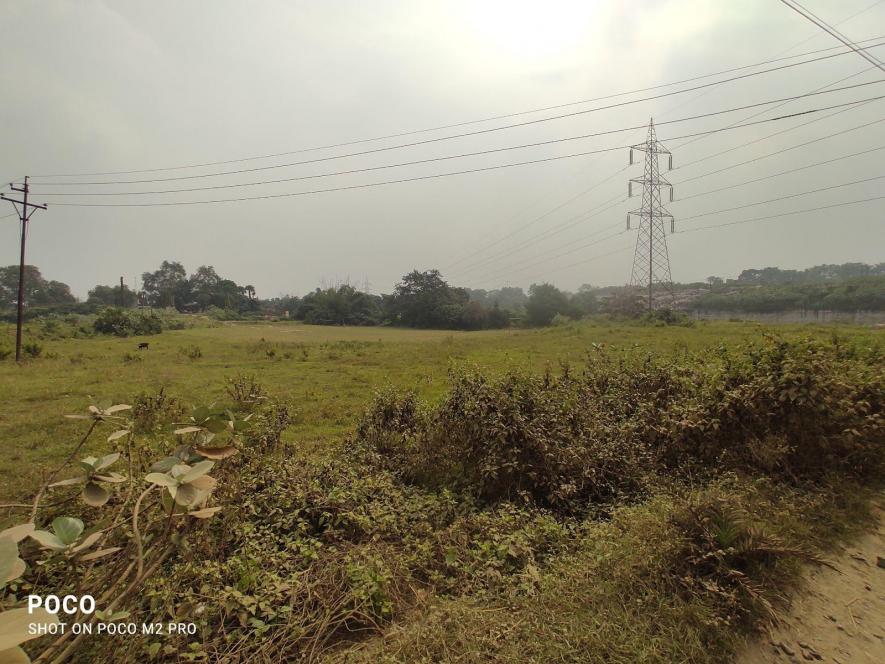
A disputed agricultural plot occupied by land grabbers in Kalipahari village in July 2022.
Baldev Ram, a landless labourer from Bangla Para village, along NH-19, has been farming for the last 30-35 years. He came to Asansol from Bhagalpur, Bihar, in search of work when coalmines were the main source of employment. He has been working for a businessman and farming his land for monthly Rs 2,000. He has grown a small homestead garden for vegetables.
On the decline of agriculture, he said, “The land is so rich that any crop can grow. But either crops don’t get enough water on time or they rot due to waterlogging caused by erratic rainfall.”
Paddy and vegetables were in abundance, he said. “But excessive illegal mining ruined the land. Illegal miners cut away the pillars of closed mines, releasing gasses that turn agricultural land useless.”
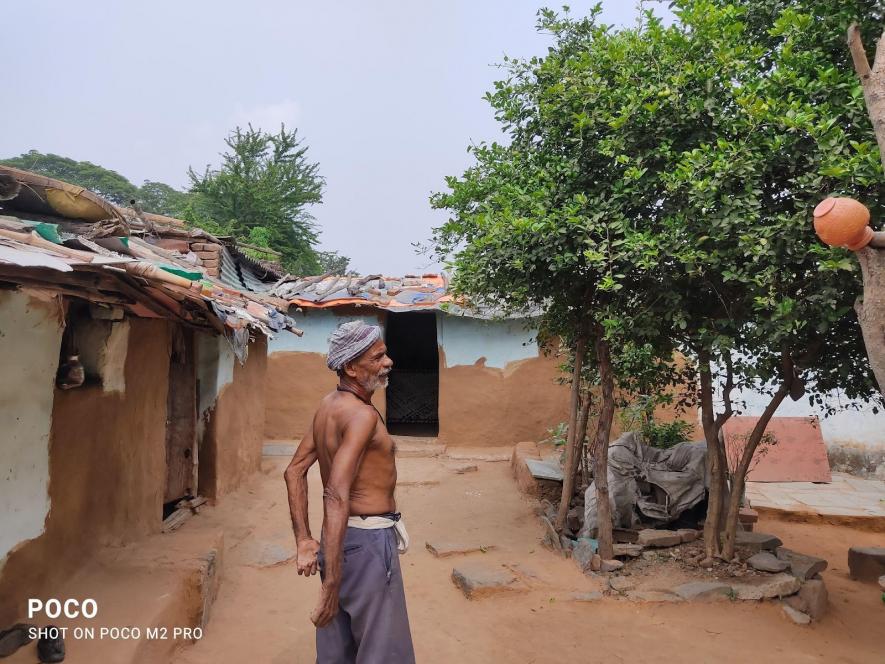
Baldev Ram, a landless labourer from Bangla Para village, at his house.
Schoolteacher Rajesh Mahato said that the high unemployment rate triggered large-scale migration. “Farming under the current circumstances is difficult. Due to urbanisation and industrialisation, villagers quit farming. Some farming families who could afford education got government jobs or work in the nearby industrial units. The illiterate continue to do small-scale seasonal farming or work as daily wagers.”
The writer is a freelance journalist.
Get the latest reports & analysis with people's perspective on Protests, movements & deep analytical videos, discussions of the current affairs in your Telegram app. Subscribe to NewsClick's Telegram channel & get Real-Time updates on stories, as they get published on our website.














